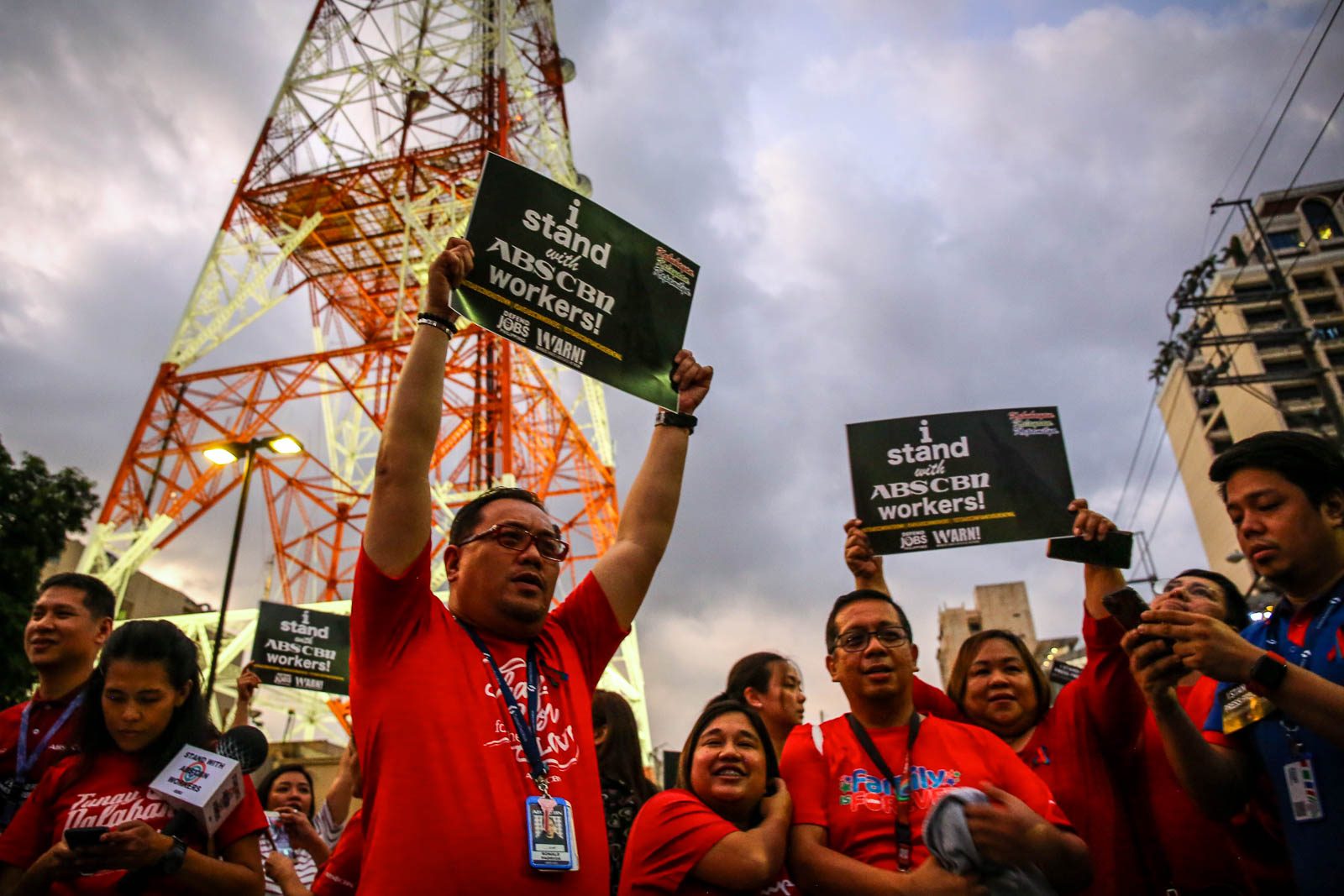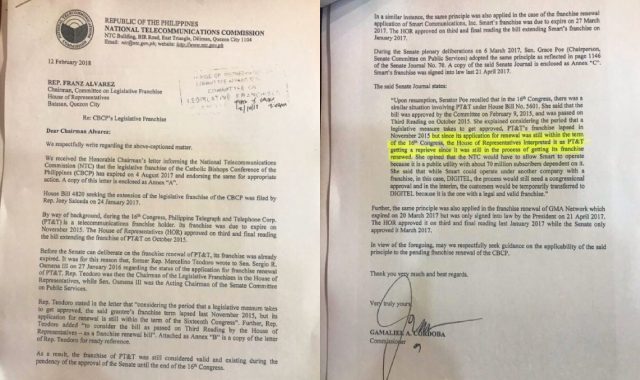SUMMARY
This is AI generated summarization, which may have errors. For context, always refer to the full article.

MANILA, Philippines – ABS-CBN Corporation may continue to operate past its franchise expiration on May 4, but this would be – as what legal experts have described – standing on shaky ground.
At stake is press freedom, because the top broadcasting network is one of 3 media companies that President Rodrigo Duterte has targeted for closure since assuming power in 2016 – aside from the Philippine Daily Inquirer and Rappler. More than 11,000 ABS-CBN employees also stand to lose their jobs should the company be forced to cease operations after May 4. (READ: TIMELINE: Duterte against ABS-CBN’s franchise renewal)
A Senate hearing on Monday, February 24, presented regulatory and government agencies that cleared ABS-CBN of allegations it evaded taxes, abused its pay-per-view services, practiced unfair labor, and allowed foreign ownership. (READ: Senate hearing on ABS-CBN: No breach of laws, franchise terms)
Congress has around two weeks remaining before it adjourns on March 14. Legislators will be back on May 4, the same day ABS-CBN’s 1995 franchise expires.
Republic Act 7966, which granted ABS-CBN’s franchise, is set to expire 25 years from March 30, 1995. But since the law became effective only 15 days after its publication on April 19 that year, the justice department said the franchise actually expires on May 4, 2020.
Subsidiary ABS-CBN Convergence’s franchise, meanwhile, was enacted on February 23, 1995 through Multi-Media Telephony. Convergence’s current offering “ABS-CBN TVplus,” where the pay-per-view “Kapamilya Box Office” can be availed of, is also the subject of Solicitor General Jose Calida’s quo warranto petition in the Supreme Court. Its 25-year franchise is set to expire this year as well.
What happens now?
Scenario 1: NTC issues provisional broadcast permit
The National Telecommunications Commission (NTC), the agency responsible for issuing permits to allow broadcast operations, can allow ABS-CBN to operate as it awaits renewal of its franchise.
Senator Grace Poe, citing precedence, said NTC did not close down the telecommunications operations of Smart and PT&T when their franchises expired and as they waited for their renewal.
The same principle was applied when the Catholic Bishops’ Conference of the Philippines’ (CBCP) franchise lapsed, with NTC asking Congress for “guidance.” In a February 2018 letter to the House of Representatives obtained by Rappler, NTC had to ask the lower chamber to apply the case of Smart and PT&T to CBCP’s broadcast arm.

In the case of ABS-CBN, Justice Secretary Menardo Guevarra said that NTC can issue a provisional authority on the basis of “equity.” He said this can be applied when there’s a gap in the law. A retired chief justice disagrees, however. (READ: What are legal grounds for ABS-CBN to air after May 4?)
“Hindi naman kasalanan ng company na hindi pa naa-aprubahan ng Kongreso ‘yong kaniyang application (It’s not the fault of the company if Congress has yet to approve its application),” said Guevarra in a chance interview on Monday.
Guevarra added that a concurrent resolution adopted by Congress – which does not need to be signed by the President – can be the basis for NTC’s temporary permit.
Even then, NTC Commissioner Gamaliel Cordoba conceded this can be “withdrawn anytime,” if alleged franchise violations are proven true.
Senate President Vicente Sotto III questioned the need for Congress’ intervention when previous cases were allowed by NTC. “Why are they placing the burden on us? They should be decisive enough to act,” Sotto said on Tuesday, February 25.
Scenario 2: Congress passes resolution allowing ABS-CBN to operate until 2022
Senators are not convinced that a “concurrent resolution” would provide ABS-CBN legal basis to operate without a new franchise.
A concurrent resolution, when adopted, does not have the effect of law, senators said. In the case of ABS-CBN, a concurrent resolution can be adopted in one congressional session, which merely conveys the sense of the two chambers about extending the media giant’s franchise.
A joint resolution, on the other hand, follows the same approval process for a bill. It passess through the 3rd reading and requires the signature of the President. Like a bill, it has the effect of law. It is the route taken, for instance, whenever the validity of national budgets is extended.
So far, Senate Minority Leader Franklin Drilon and Cebu City 1st District Representative Raul del Mar have both filed joint resolutions seeking to extend the validity of ABS-CBN’s franchise to 2022. Drilon wants it extended until December 31, 2022, while Del Mar proposed a shorter period, June 30, 2022.
Drilon stressed that while a concurrent resolution cannot be a “legal basis” for ABS-CBN to operate, he said he would still file one just to show and send the signal to NTC the Senate’s position favoring the company’s continued operations.
There are strictly around 7 session days left before Congress adjourns on March 14, but this is enough time for a concurrent resolution.
It would take a miracle, though, for a joint resolution to be passed within the period – from discussions at the committee level to deliberations, amendments, and final approval in the plenary.
The Drilon-led joint resolution has already been heard by Poe’s Senate committee, while the House hasn’t tabled its counterpart hearing. The House, however, started “proceedings” on Monday, February 24, by asking stakeholders to submit position papers on the renewal of ABS-CBN’s franchise.
“Minsan may mirakulo din naman sa House of Representatives, na natatapos naman nila kaagad ‘pag talagang priority measure. Normally, mahihirapan tayo lalong-lalo na ‘pag isang isyu na pinag-uusapan na ganito, dahil mahaba-haba ang debate, pero baka naman sakaling mangyari ‘yun,” Poe said of the joint resolution.
(Sometimes the House of Representatives can work miracles, when they immediately pass a measure if it’s priority. Normally, we encounter difficulties whenever we hear issues as huge as this, because the debates are long, but maybe it can happen.)
Scenario 3: Congress passes law renewing ABS-CBN’s 25-year franchise
Congress passing the bill renewing ABS-CBN’s franchise anytime soon seems unlikely, as the lower chamber’s legislative franchise committee has not indicated it would fast-track the process.
Apart from presidential ire, no less than House Speaker Alan Peter Cayetano has an axe to grind against the media network, accusing it of unfair election coverage in the 2010 and 2016 elections. Cayetano even said that the House will schedule hearings on the franchise as late as “May or August.”
But if Congress decides to act swiftly on the franchise bill when session resumes from May 4 to June 5, then all ABS-CBN has to do is to wait for the President to sign it.
After all, ABS-CBN’s CEO has already apologized to the President. Duterte’s aide, Senator Christopher “Bong” Go, also said he would “appeal” to the President for him to reconsider his stand against the company.
Should Duterte decide to veto the measure, it would take a two-thirds vote from Congress to overturn it.
Scenario 4: ABS-CBN ceases operations after franchise expires
It’s almost an unthinkable scenario.
Whether ABS-CBN will be allowed TV and radio operations between the time its franchise expires and the day it’s finally renewed is still up for debate. But if NTC decides to just implement the President’s wishes, then ABS-CBN and Convergence will have to stop operating after May 4.
While parent company ABS-CBN Holdings would still be able to survive sans the franchise, revenues would drop significantly. ABS-CBN Holdings has since diversified to cable, digital media, merchandise, and consumer experiences.
Based on its latest financial statement, ABS-CBN Holdings has consolidated revenues amounting to P32 billion for the first 3 quarters of 2019. More than half of that (P17.11 billion) came from advertising, while about a third (P10.22 billion) came from subscription revenues largely from SkyCable.
The non-renewal of the franchise will be bad for business. It will not be appetizing for investors, Philstocks head of research Jun Calaycay earlier told Rappler. (READ: ABS-CBN stocks fall after Duterte’s threats of not renewing franchise)
Government also stands to lose, based on ABS-CBN’s previous years’ tax payments, an average of P4.8 billion in corporate income taxes and roughly P1 billion in personal income taxes.
The Philippine Competition Commission also warned against ABS-CBN’s closure, saying a less competitive environment would give undue advantage to the next biggest network, GMA, which may end up getting at most 55% of the total market share.
ABS-CBN’s closure will also have a chilling effect on the media and the public. It is the same company, after all, that was shut down by dictator Ferdinand Marcos when he declared Martial Law in 1972. – Rappler.com
Add a comment
How does this make you feel?
There are no comments yet. Add your comment to start the conversation.